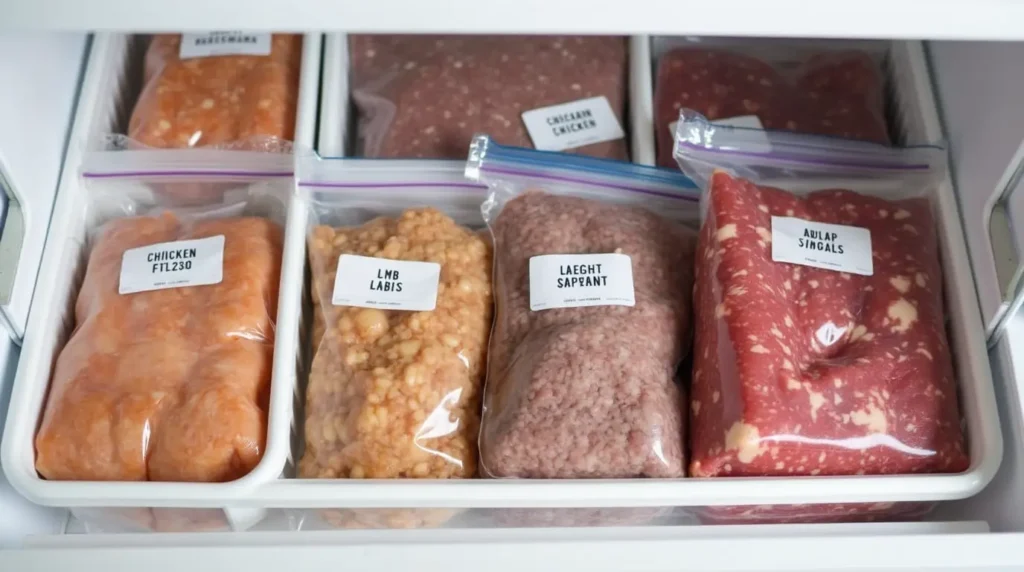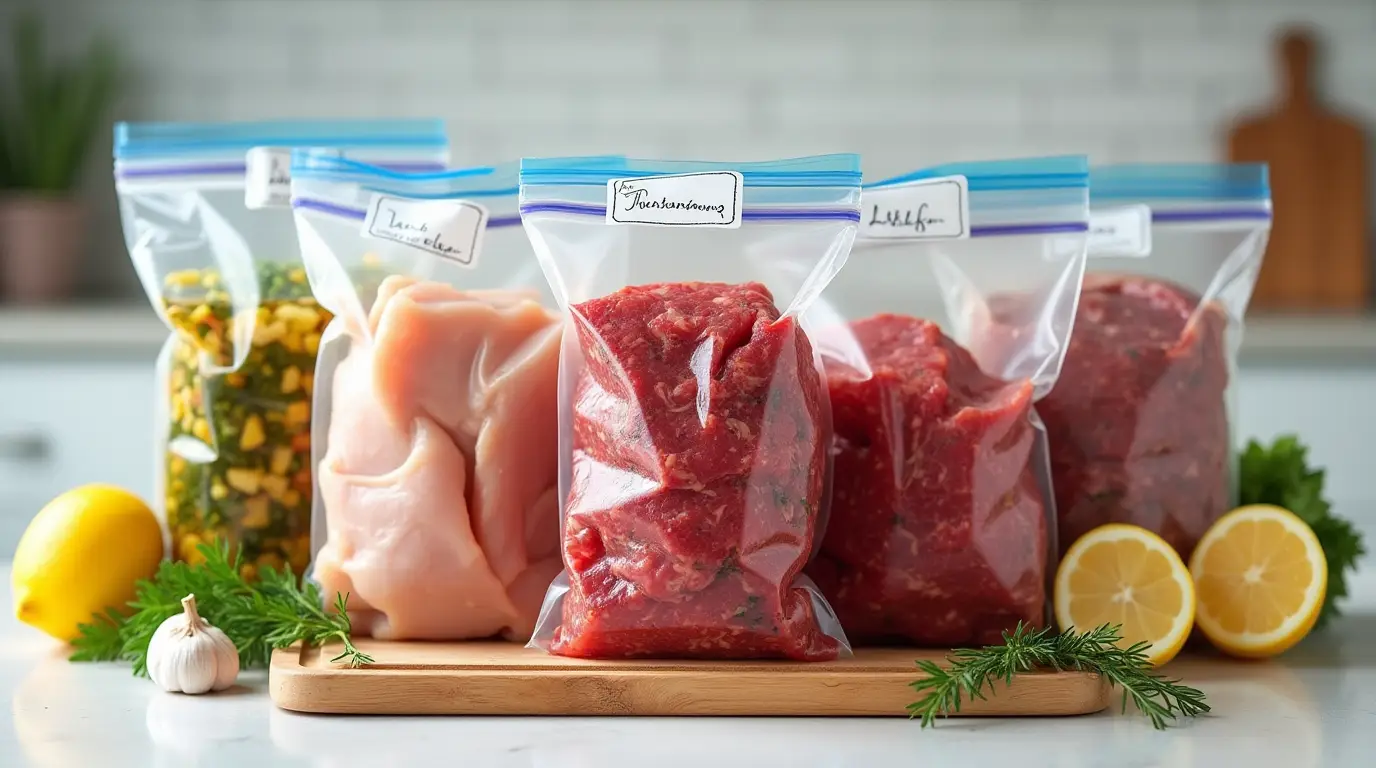Marinating meat is a time-tested way to infuse bold flavors and tenderize cuts for mouthwatering meals. But what if you could take this culinary tradition a step further by freezing marinated meat for ultimate convenience? Whether you’re preparing meals in advance, making the most of bulk meat purchases, or looking to simplify your busy weeknights, freezing marinated meat is a game-changer.
Not only does it save time and reduce food waste, but it also ensures that your dishes are always bursting with flavor. However, there’s a science to doing it right understanding the proper methods for preparation, freezing, and thawing is essential to maintain safety and taste. In this article, we’ll explore why freezing marinated meat is such a handy kitchen hack, guide you through safe techniques, and share tips to preserve the vibrant flavors of your marinades. Let’s dive into the delicious world of freezing marinated meats!
Table of Contents
Why Freezing Marinated Meat is a Game-Changer for Home Cooks
For home cooks juggling the demands of busy schedules and a desire to serve flavorful meals, freezing marinated meat is nothing short of revolutionary. Imagine the convenience of pulling out a perfectly seasoned piece of meat, ready to cook, without the extra prep time. The ability to freeze marinated meat opens the door to saving time, reducing food waste, and elevating the taste of home-cooked meals.

The Time-Saving Advantage
When you freeze marinated meat, you eliminate the need for same-day seasoning. Many home cooks struggle to find time during the week to marinate meat for hours to achieve maximum flavor. By preparing and marinating in advance, you can store your meat in the freezer and simply defrost it when needed. This simple step turns a time-consuming process into a quick and seamless experience, allowing you to enjoy delicious meals even on the busiest days.
Reducing Food Waste
Freezing marinated meat is also an excellent strategy for reducing food waste. Leftover marinades and unused portions of meat often end up in the trash. Instead, you can marinate extra portions and freeze them for later use. Whether you’ve overestimated your needs or scored a great deal on bulk meat, freezing ensures that nothing goes to waste while preserving the integrity of the meat.
Consistent, Delicious Flavor
Another advantage of freezing marinated meat is the consistency it brings to your cooking. Marinating meat before freezing allows the flavors to seep deeply into the meat, enhancing its taste after cooking. The process of freezing can actually help lock in the flavors, ensuring that each bite is as tasty as you intended. Whether it’s chicken, beef, or lamb, frozen marinated meat delivers mouthwatering results every time.
Recipe: Herb and Garlic Marinated Chicken Breasts
This recipe showcases the simplicity of preparing marinated chicken for freezing. Perfect for a quick weekday meal or a flavorful dinner party dish!
Ingredients:
- 4 boneless, skinless chicken breasts
- 3 tablespoons olive oil
- 3 cloves garlic, minced
- 1 tablespoon fresh rosemary, chopped
- 1 tablespoon fresh thyme, chopped
- 1 teaspoon salt
- ½ teaspoon black pepper
- Juice of 1 lemon
Instructions:
- In a small bowl, whisk together olive oil, garlic, rosemary, thyme, salt, pepper, and lemon juice.
- Place the chicken breasts in a resealable plastic bag or airtight container.
- Pour the marinade over the chicken, ensuring all pieces are evenly coated.
- Seal the bag or container, removing as much air as possible.
- Label the package with the date and freeze immediately.
When ready to use, simply defrost in the refrigerator overnight and cook as desired—grill, bake, or pan-sear for a delicious, hassle-free meal.
This section highlights the immense convenience and benefits of freezing marinated meat while offering a practical recipe to get started.
How to Freeze Marinated Chicken and Other Meats Safely
Freezing marinated meat is a fantastic way to simplify your cooking routine, but doing it safely is crucial to ensure both the quality of your food and the health of your loved ones. Proper handling and freezing techniques are essential to prevent contamination, preserve the flavor, and maintain the texture of your marinated meats.

The Basics of Freezing Marinated Meat
The first step in safely freezing marinated meat is ensuring that the meat is fresh before marinating. Whether you’re working with chicken, beef, lamb, or fish, starting with fresh ingredients helps maintain quality during freezing. Avoid freezing meat that has already been thawed from a previous freeze, as this can compromise texture and increase the risk of bacteria growth.
To prepare for freezing:
- Place the marinated meat in a freezer-safe bag or container. Airtight options work best to minimize exposure to air, which can cause freezer burn.
- Label the package with the type of meat, marinade used, and the date of freezing. This makes it easy to keep track of your frozen inventory.
Can You Freeze Marinated Chicken?
Yes, you absolutely can freeze marinated chicken, and it’s one of the easiest meats to prepare in advance. Chicken soaks up marinades beautifully, and freezing doesn’t diminish its ability to retain flavor. However, there are a few safety measures to follow:
- Use freezer-safe containers or resealable bags to prevent leaks.
- Avoid marinades with dairy or cream, as these can separate or become grainy after freezing.
- For best results, freeze marinated chicken for up to three months. While it may remain safe to eat beyond that time, the flavor and texture can degrade.
Tips for Freezing Other Meats
- Beef and Lamb: These hearty meats can handle longer marination times, making them excellent candidates for freezing. Marinades with acidic ingredients like vinegar or citrus can help tenderize tough cuts, but don’t overdo it to avoid mushy textures.
- Fish and Seafood: Marinate and freeze seafood only for short periods, ideally under two months. Light marinades with herbs and oils work better than heavy ones.
- Pork: Pork chops and tenderloins respond well to sweet and savory marinades. Ensure the pieces are fully submerged in the marinade to prevent freezer burn.
Freezing Marinated Meat Safety Guidelines
When it comes to freezing marinated meat safely, a few extra steps can make all the difference:
- Avoid Cross-Contamination: Always marinate meat in a separate container from other food items, and never reuse leftover marinades unless boiled first.
- Freezing Timeframe: Freeze marinated meat as soon as possible to lock in freshness. Allowing it to sit in the refrigerator for too long before freezing increases the risk of spoilage.
- Defrost Safely: Thaw frozen marinated meat in the refrigerator rather than at room temperature to prevent bacteria growth. Never refreeze thawed meat, as this can compromise safety and texture.
Freezing marinated meat is a powerful tool for any home cook, but safety must always come first. With proper preparation, storage, and handling, you can enjoy the convenience of ready-to-cook, flavorful meals without compromising quality.
Top Tips to Preserve Flavor When You Freeze Marinated Meat
Freezing marinated meat can be a game-changer in your kitchen, but preserving the vibrant flavors of your marinade during the freezing process requires a bit of know-how. With the right techniques, you can ensure that your frozen marinated meats emerge from the freezer tasting as fresh and delicious as the day you prepared them.

Use High-Quality Ingredients
When you freeze marinated meat, the quality of the ingredients in your marinade plays a significant role in the final result. Fresh herbs, spices, and oils retain their potency better during freezing than dried or lower-quality substitutes. For example:
- Opt for fresh garlic over garlic powder for a more robust flavor.
- Use extra virgin olive oil for its rich taste and stability during freezing.
For acid-based marinades, like those containing lemon juice or vinegar, balance the acidity with oils or sweeteners to avoid overwhelming the meat during freezing and thawing.
The Role of Marinade Composition
The composition of your marinade can greatly affect how well the flavors are preserved during freezing:
- Oily Marinades: These work exceptionally well, as the oil coats the meat and helps seal in moisture and flavor.
- Herb-Infused Marinades: Herbs like rosemary, thyme, and cilantro freeze beautifully, maintaining their aroma and taste.
- Avoid Dairy-Based Marinades: Ingredients like yogurt or cream can separate during freezing and lose their consistency, which may alter the flavor.
Maximize Flavor Absorption
To ensure the marinade penetrates deeply into the meat before freezing:
- Marinate the meat for 2-4 hours in the refrigerator before placing it in the freezer. This allows the flavors to infuse without breaking down the meat’s texture.
- Use vacuum-sealed bags or remove as much air as possible from resealable bags. This minimizes oxidation and helps the meat absorb the marinade evenly.
Prevent Freezer Burn
Freezer burn can ruin the texture and flavor of marinated meat. To avoid this:
- Use heavy-duty freezer bags or airtight containers designed specifically for freezing.
- Double-wrap the meat if using thin plastic bags, and ensure there are no punctures where air could enter.
- Store the meat in the coldest part of the freezer (ideally at 0°F or -18°C).
Best Practices for Thawing
Even the best-marinated meat can lose its appeal if not thawed correctly. Here’s how to do it right:
- Thaw in the Refrigerator: This is the safest method and ensures the marinade redistributes evenly during thawing.
- Avoid Hot Water or Microwaves: Rapid thawing methods can partially cook the outer layer of the meat, altering its texture and flavor.
- Cook Immediately After Thawing: Marinated meat is at its peak flavor right after it’s thawed, so plan to cook it as soon as it’s ready.
Bonus Recipe: Lemon-Herb Marinated Beef Skewers
For an exciting way to use your frozen marinated beef, try this simple and flavorful recipe.
Ingredients:
- 1 pound beef sirloin, cut into cubes
- 3 tablespoons olive oil
- 2 tablespoons lemon juice
- 1 teaspoon Dijon mustard
- 2 cloves garlic, minced
- 1 tablespoon fresh rosemary, chopped
- 1 teaspoon salt
- ½ teaspoon black pepper
Instructions:
- Marinate the beef cubes in the olive oil, lemon juice, mustard, garlic, rosemary, salt, and pepper mixture for 2-4 hours.
- Freeze the marinated beef in a resealable bag, removing excess air before sealing.
- When ready to cook, thaw the beef in the refrigerator overnight.
- Skewer the beef cubes and grill on medium-high heat for 8-10 minutes, turning occasionally, until cooked to your desired doneness.
By following these tips, you can freeze marinated meat with confidence, knowing it will deliver bold flavors and juicy textures once thawed and cooked.
Conclusion
Freezing marinated meat is a versatile and practical solution for home cooks, meal preppers, and culinary enthusiasts alike. By mastering the art of freezing marinated meat, you unlock a world of flavorful possibilities while saving time and minimizing food waste. Whether it’s marinated chicken for a quick dinner or beef skewers for a special occasion, the key lies in using high-quality ingredients, following safe storage practices, and embracing proper thawing methods.
With a little preparation, you can enjoy the rich, infused flavors of marinated meat any day of the week. So, go ahead experiment with your favorite marinades, try new recipes, and let the convenience of freezing marinated meat transform your cooking routine. Your future self (and your taste buds) will thank you!
FAQs About Freezing Marinated Meat
1. Can you freeze meat that has been marinated?
Yes, you can freeze meat that has been marinated. Freezing marinated meat allows the flavors to infuse deeply and preserves the meat for future use. Just make sure to use freezer-safe bags or containers and follow proper freezing techniques to maintain quality and safety.
2. How long can you freeze marinated meat?
Marinated meat can typically be frozen for up to 3 months without losing its flavor or texture. Beyond this timeframe, the quality may start to degrade, and freezer burn could affect the meat’s taste and tenderness.
3. Can you freeze marinated chicken?
Absolutely! Marinated chicken freezes exceptionally well. To ensure safety and quality, store it in an airtight container or a heavy-duty freezer bag and label it with the date of freezing. Avoid freezing chicken in dairy-based marinades, as these can separate during freezing.
4. Does freezing marinated meat affect its flavor?
Freezing marinated meat can actually enhance its flavor since the freezing process allows the marinade to penetrate more deeply. However, the key to maintaining flavor is using high-quality marinades and following proper freezing practices to avoid freezer burn.
5. Is it safe to freeze marinated meat?
Yes, freezing marinated meat is safe as long as it is handled correctly. Always use fresh meat, marinate it under refrigeration, and freeze it promptly. Thaw the meat in the refrigerator to prevent bacterial growth.
6. Can you refreeze marinated meat after thawing?
No, you should not refreeze marinated meat after thawing. Refreezing can compromise the texture and safety of the meat. To avoid waste, portion the marinated meat before freezing so you only thaw what you need.
7. What types of marinades work best for freezing?
Oil-based marinades and herb-infused mixtures are ideal for freezing as they maintain their consistency and flavor. Avoid cream- or yogurt-based marinades, as these can separate or become grainy during freezing and thawing.
8. How should I thaw frozen marinated meat?
Thaw frozen marinated meat in the refrigerator for best results. This ensures even thawing and keeps the meat at a safe temperature to prevent bacterial growth. Avoid using hot water or leaving the meat out at room temperature to thaw.
9. Can you freeze store-bought marinated meat?
Yes, you can freeze store-bought marinated meat as long as it has not already been frozen and thawed. Check the packaging for any instructions or recommendations from the manufacturer.
10. Does freezing marinated chicken change its texture?
If frozen and thawed correctly, marinated chicken retains its texture well. However, improper freezing or thawing methods can lead to a mushy or tough texture, so follow best practices for optimal results.

